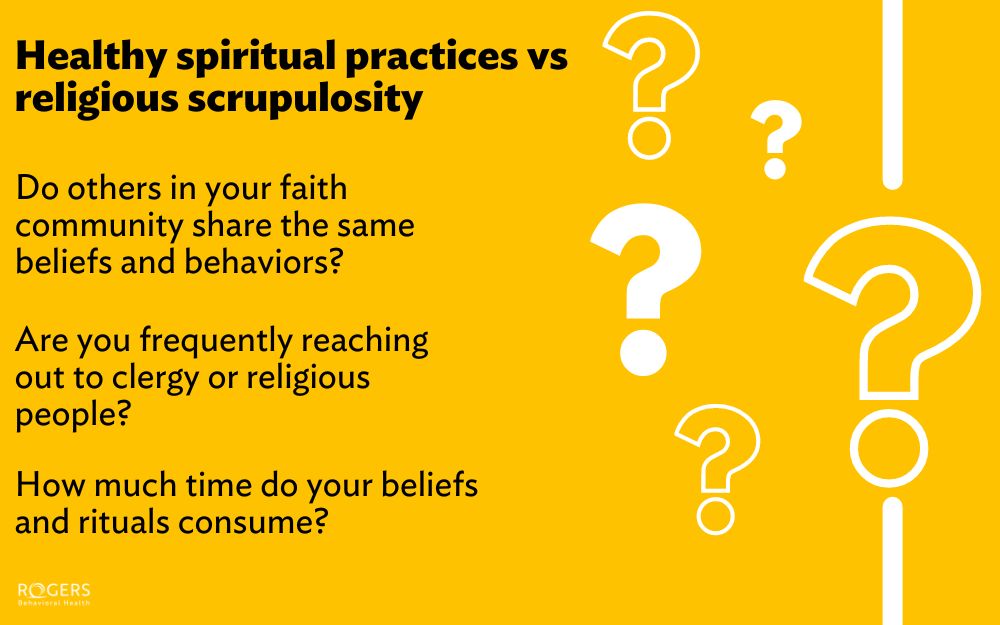What is scrupulosity or religious OCD?
Posted on 07/11/24 12:29:pm
Share this article:
Religious scrupulosity definition
Religious scrupulosity is excessive fear or concern about doing the right thing in God’s eyes. People with religious scrupulosity are incredibly afraid that deep down they’re bad people or that they will go to hell when they die. They spend a lot of time doubting or worrying that something they’re doing will be sinful and will displease God. Additionally, they frequently hyperfocus on minor aspects of their religious practice rather than the big picture.
Like all types of OCD, it includes obsessive, intrusive, and unwanted thoughts which cause anxiety. A person engages in repetitive behaviors or mental acts, called compulsions, to reduce the discomfort, which reinforces the anxiety cycle.
Symptoms of religious scrupulosity
Examples of scrupulous obsessions are:
- Mental images of a blasphemous nature
- Excessive doubt over whether a person has committed a sin
- Excessive guilt and desire to make up for past sins
- Thoughts of swearing at God; thoughts that God is evil or bad
- Dwelling on feared consequences of not carrying out religious prayers “just right”
- Over-concern with needing to “try harder” or “do better” or to be more spiritual
Examples of scrupulous compulsions are:
- Excessive repetition of religious practices/prayer
- Asking repeatedly if thoughts are sinful, confessing minor “bad” thoughts
- Treating religious books or symbols with excessive care
- Atoning through cleansing or purifying rituals
- Acts of self-sacrifice or self-punishment to make up for sinful thoughts or actions
- Repeating certain prayers, passages, or phrases; making pacts with God; temporarily reducing anxiety by replacing negative thoughts with positive ones
It’s important to note the word, “excessive.” A person with religious scrupulosity OCD engages in behaviors or mental acts that are significantly time-consuming and distressing to the point that they’re interfering with typical and healthy religious practice, their relationships, and day-to-day life.
How common is religious scrupulosity?
Nearly one in four people treated for OCD have some religious scrupulosity symptoms, however, the number of people with this type of OCD is potentially underestimated. Individuals may be more likely to seek religious guidance first before seeking clinical treatment.
We know that strong religious convictions do not cause scrupulous OCD, and people of all faiths can experience it.
What are healthy spiritual practices vs religious scrupulosity?
You can ask the following questions below to determine whether your spiritual practices are healthy:
- Do others in your faith community share the same beliefs and behaviors?
- Are you frequently reaching out to clergy or religious people about minor matters, frequent confessions, compulsive prayer, or reassurance about thoughts or behaviors?
- How much time do your beliefs and rituals consume?
Healthy spiritual practices are done out of a place of peace, not to reduce fear or distress.
How do I support a loved one with religious scrupulosity?
A person with OCD often checks with their loved ones about their repetitive thoughts and behaviors. With religious scrupulosity, that may look like someone asking whether God is mad at them or if they’re going to hell. It’s normal to want to respond with reassurance and validation, but that reinforces the OCD.
Instead, validate that your loved one is going through a hard time and empathize that it must be difficult. Respond to their reassurance seeking by saying something like, “Although I’m not going to answer your questions, know that I care and I’m here for you.” If you pray with your partner, instead of praying for the anxiety to go away, consider praying for grace and strength for them to accept and move on from the intrusive thoughts.
Religious scrupulosity, like all types of OCD, is not an adjective. It’s a real diagnosis that requires compassion. The good news is OCD is highly treatable and there is hope. Encourage your loved one to seek help.
Treatment for religious scrupulosity at Rogers
As part of treatment, the spiritual care team at Rogers is available if a patient desires, at no cost, to help address spiritual or religious concerns.
Rogers offers multiple levels of treatment for children teens, and adults. Call 800-767-4111 for a free, confidential screening.



